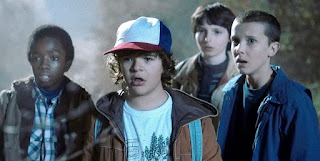*This review discusses major plot points, all of which are after the page break. You've been warned.*
While the film itself certainly can't be faulted for the controversies surround its exhibition, it is fitting that Okja is under scrutiny for the effects of late capitalism. The film is, essentially, a critique of late capitalism dressed up as a charming story of a young girl and her pet genetically-modified "super-pig." The girl, Mija (Ahn Seo-hyun), is the granddaughter of a Korean farmer who was one of 24 global recipients of a "super-piglet" from the Mirando Corporation, a chemical company-turned-agricultural giant run by Lucy Mirando (Tilda Swinton). Lucy plans to unveil the super-pigs through a "best pig" competition that presents the creature as a locally-sourced, completely natural organism that is environmentally friendly to boot, rather than the factory-grown-and-slaughtered GMOs going into the company's new sausages. Mija's pig, Okja, is selected by the company's Steve Irwin-esque celebrity spokesman Johnny Wilcox (Jake Gyllenhaal) as the best pig, and so Okja is off to New York for the public unveiling. Mija follows her beloved pet and, with the help of the Animal Liberation Front, attempts to rescue Okja and expose the truth behind Mirando's super-pigs.
As in Bong's previous feature, Snowpiercer, Okja juggles multiple ideas and tones throughout its two-hour running time. He is not quite as successful at pulling off that trick as he has been in the past, but Okja is nonetheless a fascinating satire of globalized capitalism.
More *SPOILERS* after the break.






